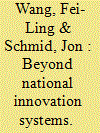|
|
|
Sort Order |
|
|
|
Items / Page
|
|
|
|
|
|
|
| Srl | Item |
| 1 |
ID:
153387


|
|
|
|
|
| Summary/Abstract |
This article describes the nature of innovation performance in the People’s Republic of China (PRC) in the context of its changing national innovation system (NIS). More specifically, it proposes to explain China’s lack of frontier innovation as reflected by the low quality of Chinese patents and scientific publications. Moving beyond the NIS—the prevailing framework for understanding national innovation rates—this article offers additional determinants to explain the unique profile of Chinese innovation. Through interviews with stakeholders from each of the three major NIS actor types and analysis of the incentive environment, two determinants of China’s high rate of nominal patenting are identified. First, the incentive structure facing inventors, scientists and entrepreneurs is found to be ill-suited to promoting innovation. Second, the ubiquitous officials-rank standard (guan benwei) is identified as a mediating variable that amplifies the effect of suboptimal incentives in promoting nominal (as opposed to real) innovation. In essence, the authors find that ill-structured innovation incentives and the officials-rank standard work in tandem to create a high proportion of nominal innovations in the PRC.
|
|
|
|
|
|
|
|
|
|
|
|
|
|
|
|
| 2 |
ID:
142588


|
|
|
|
|
| Summary/Abstract |
To stimulate the development of new technologies is nowadays one of the main goals of public policies in developed and emerging countries. However, certain high-tech sectors are mainly driven by government procurement, increasing the active role of government in investments and research. In this sense, this paper aims to identify, compare and discuss mechanisms used to foster innovation in specific high-tech sectors in which government is the main client. This research analyses the innovation mechanisms in the space industry in an emerging country and a developed country, taking Brazil and The Netherlands as contrasting examples. A case study research was conducted, in which representatives in companies and research centres with space related activities were interviewed, comprising twelve organizations in both countries. Results of the Dutch space industry demonstrated the role of committees involving government, industry and researchers in space technology. These committees discuss which the technological pathways of space industry are, aligning scientific research with companies' needs. In Brazil, the introduction of the Innovation Act in 2004 began to stimulate interaction between university, industry, and government. However, these relationships are mainly informal and incipient. As a conclusion, it could be observed that while in The Netherlands different agents join efforts in order to plan the sector's technological development; in Brazil such relationships are still incipient. This difference could be explained by a modest technological development of Brazilian companies and research institutes, which mainly import products from foreign companies. Learning from the Dutch experience, in order to improve the Brazilian space sector it is necessary to foster S&T activities through joint activities between universities, companies and government.
|
|
|
|
|
|
|
|
|
|
|
|
|
|
|
|
|
|
|
|
|